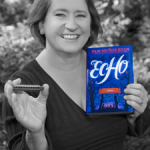Tag Archives: diversity
Middle Grade Monday book review: The Great Trouble by Deborah Hopkinson
I’m going to try to read all the books that are on the 2015-16 OBOB list with me and I’m so happy to start with a wonderful book by my friend and fellow Portlander, Deborah Hopkinson. This is a story after my heart because epidemiology was my 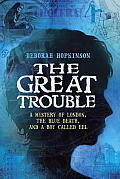 mother’s field. It’s an account of how the enterprising Dr. Snow and a couple of street urchins proved that a cholera epidemic that a broke out in Victorian London was caused not by the heavily polluted air but by the contaminated water in the Broad Street pump.
mother’s field. It’s an account of how the enterprising Dr. Snow and a couple of street urchins proved that a cholera epidemic that a broke out in Victorian London was caused not by the heavily polluted air but by the contaminated water in the Broad Street pump.
Three things for a kid reader to love:
1. Any kid who lives Bones or CSI or other tv crime scene procedurals will love this. It’s full of real nitty gritty details of how to prove that disease is water-borne when the water tastes fine and the air stinks. Great fun, and not “teach-y”
2. Cool historical maps of the epidemic are in the back matter. Love Maps!
3. The narrator, a kid who goes by the name Eel, is appealing and keeps the events on a very human scale. In finding and answer to the riddle of the Broad Street pump, Eel finds a home and protection and education for his beloved little brother.
Something for the writer to think about:
Any story about an epidemic is going to be tragic and this one doesn’t shrink from death. However, and this is the important distinction to me, it doesn’t revel in death or glamorize suffering. It’s a fine line to walk and I think it’s handled beautifully. Well worth a read just to see how Deborah gets the balance just right.
Also I’m going to tag this as a diverse book in terms of class. It addresses very directly the injustices Eel faces because of his economic status. It’s easy to over-look or romanticize the poor. Here’s a book that in my opinion does them justice. The low-income characters are a mix of good and bad actors and the upper-income characters are an equally mixed bag in terms of personal virtue. Bravo!
Middle Grade Monday book review: ECHO by Pam Muñoz Ryan
Ordinarily I just take the jpeg of a book cover from the internet, but for this one I just had to take a picture of the book with my Hohner vest pocket harmonica. It’s smaller than the instruments referred to in the story, and I haven’t played it in ages, but it reminded me how much I loved having music in my pocket as a child. Echo is hard story to sum up briefly but it’s got the best flap copy I’ve read in a while so here’s that.
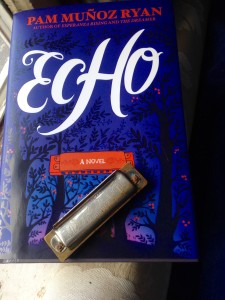 Lost and alone in a forbidden forest, Otto meets three mysterious sisters and suddenly finds himself entwined in a puzzling quest involving a prophecy, a promise, and a harmonica. Decades later, Friedrich in Germany, Mike in Pennsylvania, and Ivy in California each, in turn, become interwoven when the very same harmonica lands in their lives. All the children face daunting challenges: rescuing a father, protecting a brother, holding a family together. And ultimately, pulled by the invisible thread of destiny, their suspenseful solo stories converge in an orchestral crescendo.
Lost and alone in a forbidden forest, Otto meets three mysterious sisters and suddenly finds himself entwined in a puzzling quest involving a prophecy, a promise, and a harmonica. Decades later, Friedrich in Germany, Mike in Pennsylvania, and Ivy in California each, in turn, become interwoven when the very same harmonica lands in their lives. All the children face daunting challenges: rescuing a father, protecting a brother, holding a family together. And ultimately, pulled by the invisible thread of destiny, their suspenseful solo stories converge in an orchestral crescendo.
Richly imagined and masterfully crafted, ECHO pushes the boundaries of genre and form, and shows us what is possible in how we tell stories. The result is an impassioned, uplifting, and virtuosic tour de force that will resound in your heart long after the last note has been struck
3 things for a young reader to love
1. This is a really intriguing mix of realistic historical and fantastical elements. There’s lots to learn about the history of the 20th century here but wrapped as it is in a mythic prophesy, it doesn’t feel “teachy” yet it brings to light some really interesting and dark and difficult aspects of American and German history.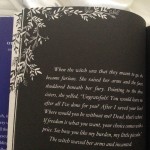
2.There is some truly beautiful book craftsmanship here: decorated pages, a lovely cover under the dust jacket, and three songs with harmonica notation in case you want to learn the music from each section of the book.
3. It’s long! I know some people are going to look at that as a disadvantage in the supposedly attention deficit MG market, but I disagree. MG readers have time to read. Some of them love long books, love the seriousness they imply, love getting wrapped up in a tale that carries them along for hours and hours. And yet there’s nothing here 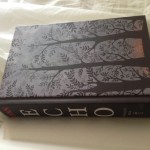 to edge it up to YA. This is the perfect book for that tender-hearted teenaged reader who is not interested in sexual relationships and blatant violence. It’s also great for that really young high level reader who needs a challenge and a story with substance but isn’t up for YA content.
to edge it up to YA. This is the perfect book for that tender-hearted teenaged reader who is not interested in sexual relationships and blatant violence. It’s also great for that really young high level reader who needs a challenge and a story with substance but isn’t up for YA content.
4. Okay I cheated 4 things. It’s diverse, seamlessly interweaving Jewish, Irish, Japanese and Hispanic experiences.
Something for the writer to think about
Prologues and epilogues are routinely discouraged by writing instructors and there are good reasons to be cautious about including one. But here’s an example of one that has been done beautifully. It’s a bold choice to mix the fantastical elements of the prologue and epilog with straight up historical fiction in the other three sections. I think it works brilliantly here making it a true bridge to the more complex and layered stories they will read as adults. And the book has something lovely to say about the nearly magical power of music to give the musician comfort and courage. I’m not a big believer in predictions, but here is a book that’s going to be on lots of best book of the year lists.
Returning Librarians to my School District
A few years ago my children’s school district faced a catastrophic shortfall in their budget. The cuts that followed were many and painful, among them the loss of every single certified teacher librarian in the largest school district in Oregon. Fortunately our funding crisis is over and we’re in the happy position of deciding how to expand services. After some very eloquent 5th graders testified to the frustration of going to the school library only to find the door locked, I added some observations as a former student, a parent, a 20 year volunteer, and a visiting author.
What I had to say may be applicable to your home school district so if you are fighting this battle in some other place, please feel free to borrow my words. If you are a parent or student in the Beaverton School District, you have one more chance to make your voice heard at a budget meeting at 6:30pm on the 20th of this month at school district headquarters.
Here are my thoughts on why my own school district needs a certified teacher-librarian in every school.
1.Teacher support
As a visiting author I am in hundreds of schools all over the country. I work with grade school, middle, and high school teachers to encourage reading and writing and generate excitement for literature. Everywhere I go I meet English and reading teachers who are genuinely excited to do the higher level reading work that new standards ask of them. They want to delve deeper into texts of all genres. They are excited to bring students the best and most current books. But not every book stands up to higher level reading. The Wimpy Kid franchise, for example, is not up to the task. In order to find the books that will bear greater scrutiny and model the best and most elegant use of language, you’d have to read several hundred books each year. It’s wildly impractical to ask every single English and reading teacher to do this every year.
A certified teacher librarian is the person well qualified to winnow the enormous variety of current books to the 30 or 40 strongest candidates so that each teacher can choose from among the best of the best. They are also the ones with the resources to help teachers find books available in translation, audio, and ebook to accommodate the needs of a diverse population.
2. Loss to private schools
There are dozens of private schools within Beaverton’s boundaries. All of them have full time teacher-librarians, and that is a huge draw. It was not always so. When my parents were choosing between public and parochial schools for me they looked at the options and saw, on the one hand, a parochial school that would see to my spiritual development and had significantly smaller class sizes, and on the other hand, a public school with a well funded library and a full time librarian. They chose public schools. The parochial schools in the area are expanding, and we stand to lose high achieving students and highly involved parents if we don’t provide school libraries. Having been in several Catholic schools over the last five years, I’ve seen relatively small libraries with limited technology. But they have a full time teacher librarian and children have full access to that smaller collection. The Beaverton school district libraries far exceed most private schools in the size and quality of the collection but that vital asset is currently behind a locked door.
3. Supporting growing diversity.
Our school district has recently become a majority non-white district. This coincides with a moment when publishers are highly motivated to publish titles with multicultural characters. Looks like a win-win situation. But if nobody is there to buy the books with non-white characters, publishers will stop making them. There is a huge need for kid’s books with non-white characters. At the moment, 90% of titles have a white protagonist. That’s a ridiculous figure and the only reason it’s true is that those books consistently sell. In order for an authentic body of literature to take root for the young readers we have today is for well funded school libraries to buy the books that reflect their populations, and make sure that kids find the books that mirror their own experience and speak to their own values. We could make a huge difference in providing a legacy of inclusive literature for children.
4. Supporting family literacy
One of the things I’ve seen in talking to immigrant students, not just in Oregon but all over, is that for many of them the school library is their only library. Whether the issue is transportation or fear of library fines or reluctance to register an address publicly, lots of kids only have access to free books through a school library. One of the strongest factors in predicting whether a child will read on grade level is access to books in the home. Our families no matter how poor or disadvantaged want to support their children’s reading. By keeping the school library behind a locked door, we deny them the number one tool in learning to read: books!
A fully funded and staffed school library supports literacy better and more efficiently by enabling the student and parent to do their share of the work. With English language learning families we have a golden opportunity in the years when parents are motivated to read aloud to their children. A teacher-librarian is in the position to put into the hands of these families the books and audio books that will, not only support the child, but lift the literacy of the parent. Then we have both higher performing students and more empowered and engaged parents–a win for the entire community.
Please consider testifying in support of fully funded and staffed libraries at the Beaverton School District Administration Center at 6:30 on Monday April 20th. 16550 SW Merlo Road, Beaverton, OR 97003.
If you are not in the Beaverton School District I hope you will consider advocating for school librarians in your home district.

